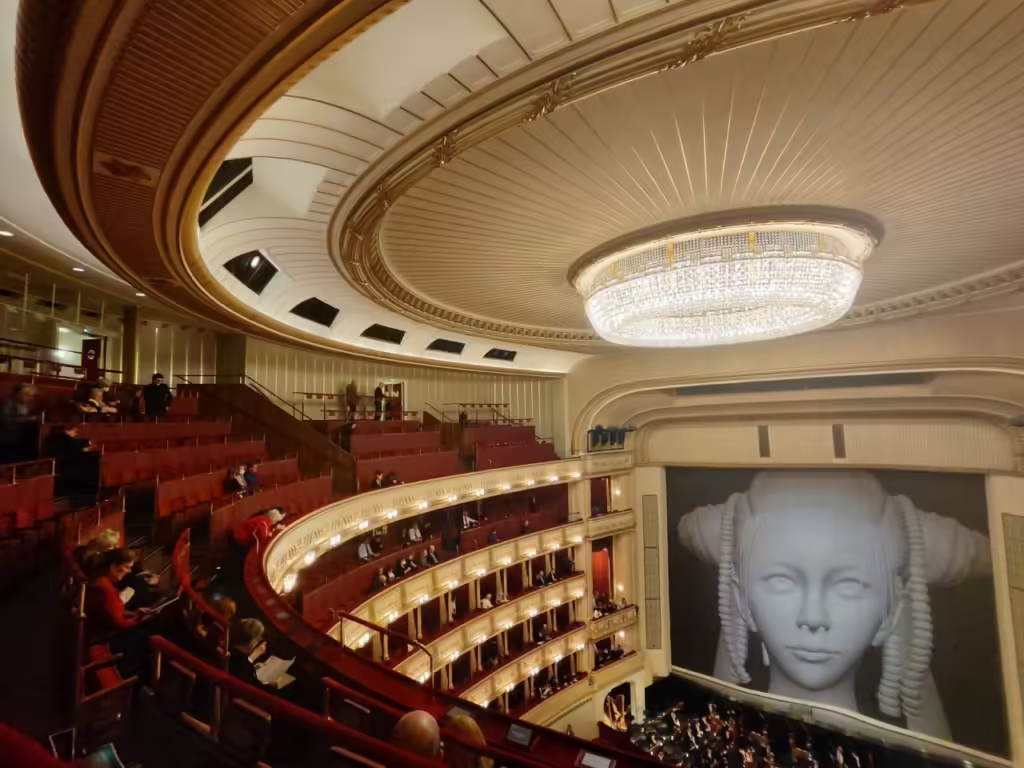Last Updated on
The Vienna dress code and etiquette during classical music concerts and performances are steeped in a rich tradition that reflects the city’s longstanding reverence for the arts. Attendees are typically expected to adhere to a sophisticated level of attire; for gentlemen, this often means donning a dark suit accompanied by an elegant tie, while ladies may opt for chic dresses or formal evening wear that embodies grace and refinement.
 The atmosphere within renowned venues such as the Vienna State Opera or Musikverein is infused with an air of solemnity, where each detail—from polished shoes to understated accessories—contributes to the overall decorum essential for such cultural celebrations. Moreover, patrons should be mindful of social etiquette; arriving on time is crucial as latecomers disrupt not only their own experience but also that of fellow concert-goers.
The atmosphere within renowned venues such as the Vienna State Opera or Musikverein is infused with an air of solemnity, where each detail—from polished shoes to understated accessories—contributes to the overall decorum essential for such cultural celebrations. Moreover, patrons should be mindful of social etiquette; arriving on time is crucial as latecomers disrupt not only their own experience but also that of fellow concert-goers.
Conversations should be kept at hushed tones before performances commence, maintaining an environment conducive to appreciation and respect for the artists’ craft. In essence, understanding the nuances of Vienna’s dress code and etiquette allows one to fully immerse in the sublime ambiance of its classical music scene, highlighting both personal style and cultural awareness within this historic city dedicated to musical excellence.
Attending a classical music event in Vienna, the world capital of classical music, is a special experience, steeped in tradition and cultural significance. Here’s a detailed guide on the dress code and customs for such events:
Dress Code
1. Formal and Semi-Formal Attire
- Concerts at Prestigious Venues: If you’re attending a concert at one of Vienna’s prestigious venues, such as the Wiener Staatsoper (Vienna State Opera), the Musikverein, or the Konzerthaus, the dress code tends to be formal or semi-formal, especially for evening performances.
- Men: A dark suit with a tie or bow tie is appropriate. For very special occasions, such as a gala or New Year’s Concert, a tuxedo or dinner jacket might be worn.
- Women: Women typically wear elegant dresses or gowns. A cocktail dress or an evening gown is suitable, especially for evening performances or special events. For less formal concerts, a smart skirt or tailored trousers paired with a blouse or elegant top is also appropriate.
- Daytime Concerts: Daytime concerts tend to be slightly more relaxed in terms of dress code. Business casual attire, such as a dress shirt and trousers for men or a smart dress or blouse and skirt for women, is usually acceptable.
2. Less Formal Venues
- Chamber Music, Recitals, and Smaller Venues: These events might be slightly less formal, but smart-casual attire is still recommended. Men: A blazer with a collared shirt and dress pants. Women: A dress, skirt and blouse, or smart pants.
- Casual Concerts and Open-Air Events: For more casual settings, such as smaller venues or open-air concerts (e.g., in Stadtpark or Schönbrunn Palace gardens), the dress code is more relaxed. Smart casual attire is generally appropriate, which might include nice jeans or trousers with a collared shirt for men, and a casual dress or nice top with trousers or a skirt for women.
- Tourists and Visitors: Tourists attending a concert might not be expected to dress as formally as locals, especially in more tourist-oriented venues. However, making an effort to dress nicely is always appreciated.
Customs and Etiquette
1. Arrival Time
- Punctuality: Austrians value punctuality, especially in formal settings. It’s important to arrive on time, ideally 15-30 minutes before the performance begins. Late arrivals may not be seated until a suitable break in the performance.
2. Before the Performance
- Cloakrooms: In many venues, especially during winter, it’s customary to check coats and larger bags in the cloakroom. This is not only practical but also considered polite, as it avoids cluttering the seating area.
- Programs: Many attendees purchase a program to follow along with the performance and learn more about the music and performers. These are usually sold at the entrance.
3. During the Performance
- Silence: Silence is expected during the performance, out of respect for the musicians and other audience members. Phones should be turned off, and talking, whispering, or any noise is considered impolite.
- Applause: Applause is usually reserved for the end of a piece rather than between movements. In Vienna, the audience often waits for the conductor to lower their baton and fully turn to the audience before applauding.
- Standing Ovations: If the performance is exceptional, a standing ovation might be given. In Vienna, this is reserved for truly outstanding performances.
4. Intermission
- Refreshments: During intermissions, it’s common to enjoy a drink or a snack at the venue’s bar or café. Champagne, wine, and small canapés are popular.
- Socializing: Intermissions are also a time for socializing. Many attendees use this time to discuss the performance or catch up with acquaintances.
5. After the Performance
- Final Applause: At the end of the performance, it’s customary to stay and applaud until the performers have left the stage. Leaving during the final bows is considered rude.
- Post-Concert: After the concert, it’s common for attendees to discuss the performance, often at a nearby café or restaurant. Vienna’s café culture is strong, and many enjoy a late-night coffee or dessert following an evening at the concert hall.
Cultural Considerations
- Respect for Tradition: Vienna is a city with a deep respect for tradition, especially in the realm of classical music. Showing appreciation for the music and performers through appropriate attire and behavior is important.
- Reserved Behavior: Austrians tend to be more reserved in public, especially at formal events. Loud or boisterous behavior is generally frowned upon in these settings.
- Gift Giving: If you’re attending a concert as a guest or with someone else, it’s not uncommon to bring a small gift, like flowers, if appropriate, particularly if you’re invited to a special event or gala.
Attending a classical music event in Vienna is about more than just enjoying the music—it’s a cultural experience that connects you to centuries of tradition and respect for the arts. Dressing appropriately and following the local customs ensures that you’ll fit in and fully appreciate the experience.

Andrea is a travel writer who splits her time between Austria and Croatia, drawing from both to tell grounded, engaging stories about culture, food, and local life. With a sharp eye for detail and a no-nonsense style, she covers everything from alpine villages and Viennese cafés to Adriatic islands and Dalmatian coastlines. Her work captures the rhythms of everyday life in both countries, beyond the tourist traps, always focused on what’s real, interesting, and worth experiencing. When she’s not writing, she’s hiking, swimming, or hunting down the best coffee in town.



